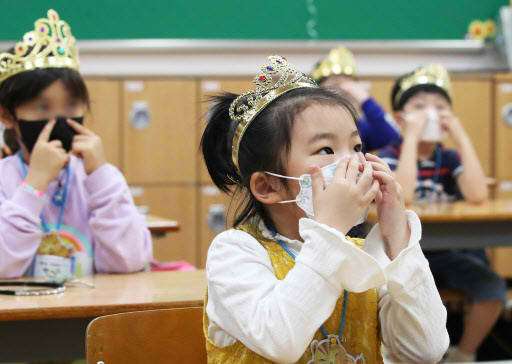SEOUL — As schools in South Korea sent some 2.37 million more students back to classrooms Wednesday, 561 kindergartens and schools in cities at high risk of community transmission of COVID-19 postponed reopening.
About 2.7 percent of the schools that were supposed to reopen Wednesday remained closed as of the afternoon, according to Education Ministry data. Most were in Seoul; Bucheon, Gyeonggi Province; and Gumi, North Gyeongsang Province; where most of the country’s new infections were reported in recent days.
On Wednesday, two high school seniors tested positive for the virus, one in Seoul and one in Daegu, leading their schools and nearby schools to shut down.
Health authorities believe the virus situation in Korea is under control despite small-scale outbreaks linked to bars and clubs in Seoul’s party district of Itaewon, and most recently a logistics center in Bucheon.
But there are lingering concerns about sending children back to classrooms, especially in Seoul and the surrounding Gyeonggi Province, home to roughly half of the country’s population, as the metropolitan area is seeing a spike in new cases.
Adding to the concerns, Korea on Monday reported two suspected of cases of multisystem inflammatory syndrome in children.
Despite the concerns, education authorities are adamant that the phased reopening of schools will go ahead as planned.
“I understand (parents’) concerns about reopening of schools in the situation where COVID-19 infections are reported sporadically,” Education Minister Yoo Eun-hae said Wednesday at a meeting with the heads of regional education offices.
“But if we cannot send our students back to school under the country’s current COVID-19 management system, schools in Korea will never be able to open again this year and classes can only be held online,” she said. “Only through remote learning, we cannot provide students with sufficient education that is only possible through face-to-face interaction with teachers at schools.”
Currently, it takes one confirmed patient for a whole school to shut down. In other cases, schools can decide whether to close after consulting with regional education offices and health authorities.
In the second phase of reopening, in-person classes resumed on Wednesday for students in kindergarten, the second year of high school, the third year of middle school and the first two years of elementary school.
High school seniors returned to school the previous Wednesday.
So far, in-person classes have already resumed for about 47 percent of the country’s students, an estimated 2.8 million, attending kindergartens and elementary, middle and high schools.
Students in their first year of high school, their second year of middle school, or their third or fourth year of elementary school will go back to classrooms June 3. Schools will reopen for the rest on June 8.
